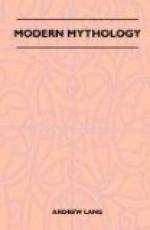To all this a reply is urged in the following pages. In agreement with Curtius and many other scholars, we very sincerely doubt almost all etymologies of old proper names, even in Greek or Sanskrit. We find among philologists, as a rule, the widest discrepancies of interpretation. Moreover, every name must mean something. Now, whatever the meaning of a name (supposing it to be really ascertained), very little ingenuity is needed to make it indicate one or other aspect of Dawn or Night, of Lightning or Storm, just as the philologist pleases. Then he explains the divine or heroic being denoted by the name—as Dawn or Storm, or Fire or Night, or Twilight or Wind—in accordance with his private taste, easily accommodating the facts of the myth, whatever they may be, to his favourite solution. We rebel against this kind of logic, and persist in studying the myth in itself and in comparison with analogous myths in every accessible language. Certainly, if divine and heroic names—Artemis or Pundjel—can be interpreted, so much is gained. But the myth may be older than the name.
As Mr. Hogarth points out, Alexander has inherited in the remote East the myths of early legendary heroes. We cannot explain these by the analysis of the name of Alexander! Even if the heroic or divine name can be shown to be the original one (which is practically impossible), the meaning of the name helps us little. That Zeus means ‘sky’ cannot conceivably explain scores of details in the very composite legend of Zeus—say, the story of Zeus, Demeter, and the Ram. Moreover, we decline to admit that, if a divine name means ‘swift,’ its bearer must be the wind or the sunlight. Nor, if the name means ‘white,’ is it necessarily a synonym of Dawn, or of Lightning, or of Clear Air, or what not. But a mythologist who makes language and names the fountain of myth will go on insisting that myths can only be studied by people who know the language in which they are told. Mythologists who believe that human nature is the source of myths will go on comparing all myths that are accessible in translations by competent collectors.
Mr. Max Muller says, ’We seldom find mythology, as it were, in situ—as it lived in the minds and unrestrained utterances of the people. We generally have to study it in the works of mythographers, or in the poems of later generations, when it had long ceased to be living and intelligible.’ The myths of Greece and Rome, in Hyginus or Ovid, ’are likely to be as misleading as a hortus siccus would be to a botanist if debarred from his rambles through meadows and hedges.’ {0c}




